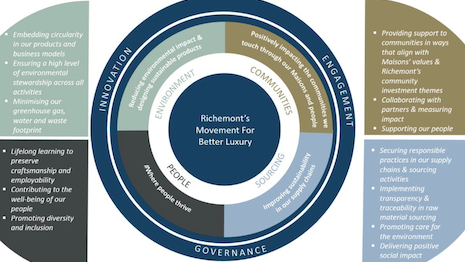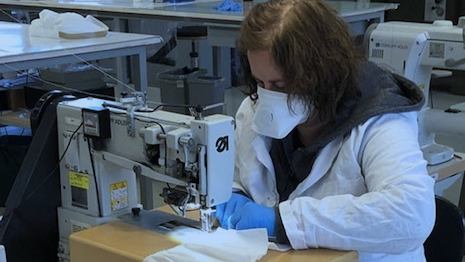 Richemont is focused on Better Luxury as part of its commitment to being more sustainable. Image credit: Richemont
Richemont is focused on Better Luxury as part of its commitment to being more sustainable. Image credit: Richemont
Climate change has become the main focus of Richemont’s sustainability program, led by an increasing number of Gen Z stakeholders who are core to the group.
Gen Z has become a more important demographic for Richemont as many of its employees are Gen Z and much of its growing customer base in Asia is Gen Z. This generation prioritizes climate change over other areas of corporate responsibility and Richemont is using this passion to fight climate change to guide its approach.
“In the coming years this generation will become ever-more important, and the perceptions they have of Richemont and luxury goods now will likely influence our future relationship,” Richemont said in its 2020 Sustainability Report.
“Therefore, understanding Gen Z is critical to the future of our business. We already know that Gen Z want to work for companies with purpose, buy from businesses that tackle social and environmental problems, and expect greater product and corporate transparency."
Geneva-based Richemont is parent to Cartier, Van Cleef & Arpels, Montblanc, Piaget, IWC Schaffhausen and Yoox Net-A-Porter, among other luxury brands and retailers.
 Richemont launched its Transformational Strategy to create "Better Luxury" last year. Image credit: Richemont
Richemont launched its Transformational Strategy to create "Better Luxury" last year. Image credit: Richemont
Better Luxury
In 2019, Richemont launched its Transformational Strategy with a mission to create “Better Luxury” by being more sustainable and responsible throughout the value chain, per Richemont’s new 2020 Sustainability Report.
The program has four focus areas: people, communities, sourcing and environment.
The company continues to strive to achieve its goals with strong governance, active engagement and continuous innovation, creating short-term, medium-term and long-term plans across its ecosystem of brands, the report pointed out.
One way that Richemont is actively implementing this approach to set science-based targets that follow the Paris Agreement.
Another is to scout for new materials and manufacturing and distribution processes that have less impact on the environment across its supply chain.
“During the past year, we have dedicated specific attention to recent developments in alternatives to animal-based leather, in new environmental-friendly tanning processes and in new supply chains based on recycled metallic materials,” the report said.
Engagement is one of the key ways that the luxury group is ensuring action on its Transformational Strategy. The goal is to engage stakeholders to support initiatives that benefit the greater good as it applies to people, communities, sourcing and environment.
The group is also beefing up its CSR divisions and embedding these staffers into leadership roles across brands. Their aim is to educate and ensure that each brand is offering equitable opportunities for a diverse amount of people.
The group also improved its transparency and reporting on corporate social responsibility (CSR) issues.
“The Transformational Strategy recognizes an enhanced role for the CSR Committee,” the report said. “That role includes challenging the performance of each focus area against targets.
"It also includes ‘scanning the horizon’ for emerging cross-cutting issues such as business and human rights and how Richemont can best support the achievement of the Sustainable Development Goals.”
 IWC Schaffhausen's new packaging uses 30 percent less material and 90 percent less plastic than before. Image credit: Richemont
IWC Schaffhausen's new packaging uses 30 percent less material and 90 percent less plastic than before. Image credit: Richemont
IWC Schaffhausen
Swiss watch brand IWC Schaffhausen was a key case study highlighted in Richemont’s annual report for its focus on becoming a sustainability leader.
IWC was the first luxury watch brand to sign the Ellen MacArthur Foundation’s New Plastic Economy Global Commitment, committing to reducing plastic waste.
To honor the commitment, IWC introduced new packaging, which contains 90 percent less plastic than before and reduced the average packaging weight and volume by 30 percent.
The maison will continue to pursue efforts to cut down on single-use plastics in its logistics process and is using recyclable shopping bags made of 100 percent post-consumer Forest Stewardship Council-certified paper.
IWC was certified with the strict designation of the Responsible Jewelry Council (RJC) with its 2019 Code of Practice standard. The gold used in its watches comes from recycled sources certified by the RJC.
Additionally, the brand takes sustainability seriously in the workplace, preparing food in the offices from locally sourced and seasonal ingredients with vegan options. The watch brand also subsidizes public transport for employees.
The company is currently working on its new 2022 targets.
“Within the luxury watch sector, through its wide-ranging actions and disclosures, IWC Schaffhausen has established itself as a sustainability leader,” the report said.
“Amongst its recent engagements, the following actions and accolades have helped the maison to deepen its stakeholder engagements on sustainability matters.”
 Richemont focused on health and safety, business continuity, remediation and restart measures when Covid hit. Image credit: Richemont
Richemont focused on health and safety, business continuity, remediation and restart measures when Covid hit. Image credit: Richemont
Pandemic reaction
Even as the COVID-19 pandemic hit, the company honored its commitment to its better luxury principles. To deal with these unique and challenging times, Richemont focused on four pillars: health and safety, business continuity, remediation and restart measures.
The group focused on guidance from the World Health Organization, as well as from governmental and local health guidelines.
Additionally brands including Serapian, Yoox Net-A-Porter and Cartier made generous donations to the community at large.
Richemont kept its employment rate high and honored its contracts to help keep the supply chain in order.
The group implemented remediation measures for cash preservation, tailored inventories to end-consumer demand and adjusted production capacities and corresponding supply chain needs accordingly.
As stores and offices remained closed, the company began to invest on its “New Retail” operating model, with a heavy focus on big data and digital.
“Our overarching goal during the period was to protect our people and preserve our ability to benefit from any improvement in the economic environment,” the report said.
Please click here to download the PDF of the Richemont Sustainability Report 2020
